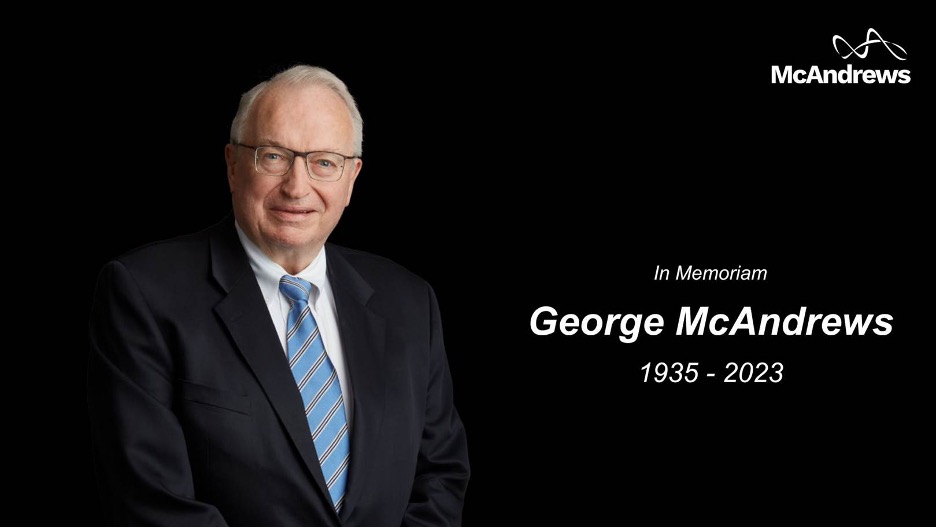Remembering George
04.07.23
George P. McAndrews’ career was the stuff of legal legend, but he was larger than life in many ways.
Born in Clinton, Iowa, George received a bachelor’s degree with honors in mechanical engineering from the University of Notre Dame, where he was elected “Engineer of the Year.” During a two-year break in his undergraduate studies, he and his brother Tom enlisted in the Navy. As part of their deployment, the brothers participated in Operation Redwing, a series of 17 nuclear detonations conducted at the Enewetak and Bikini atolls in the South Pacific. With thousands of other military personnel, George and Tom were later officially designated “Atomic Veterans” for the unique nature of their service. He later received his J.D. from the University of Notre Dame, ranking second in his class and serving as editor-in-chief of the Notre Dame Law Review and Chairman of the National Council of Law Review Editors. He also received honorary Doctorates of Humane Letters and of Human Biology.
George, Tim Malloy, John Held, and others came together 35 years ago to form what is now one of the country’s premier, full-service intellectual property and technology law firms. Today, McAndrews offers one of the largest single teams of USPTO-registered attorneys with science and engineering degrees.
George represented many clients involved in both million-dollar and billion-dollar patent disputes. Few patent litigators in the nation achieved as many significant awards for clients, ranging from $1 million to $2 billion in size. He also represented clients that have been unjustly accused of patent or trademark infringement or to whom exorbitant, unjustified demands had been made.
In 1997, after a successful 19-day complex patent jury trial involving more than ten attorneys, a professional jury consultant reported: “Of all the lawyers, George McAndrews had the most positive image among jurors. This was true of jurors who favored [his client] as well as [the defendant]. Specifically, jurors felt Mr. McAndrews showed respect to the witnesses and did not talk down to the jury. His clarity helped the jurors the most to make sense of this complexity.”
Federal judges also had high praise for George’s work. One wrote to him, “That was without a doubt the finest opening statement I have ever heard in my entire career, both on the bench and in trial practice. Your final arguments were superb! You have demonstrated one of the finest pieces of representation that I have ever had the pleasure to see.”
His clients showered praise upon George and the firm he helped found. One said, “Without exaggeration, the firm is fantastic. Mr. McAndrews sets the tone for the entire firm. His attention to detail, responsiveness, professionalism, and keen sense of client needs are reflected in everything the firm does.” Another noted, “[T]he highlight of the trial was your closing. I unsuccessfully fought back tears as you led the jury through the concepts of our legal process. When you said that you appeal to the common sense of the ordinary citizen, I couldn’t keep my face dry. It was a beautiful presentation that clearly flowed from your deep respect and love for our legal system.”
George was also an extraordinary mentor for many attorneys who now lead the firm. Shareholder Greg Schodde, a 33-year McAndrews veteran, shared this reflection:
It was from George that I learned that trials are indeed crucibles. At trial, all the clutter, the trivia, all the things we thought were important and fought endless battles over for months, all that falls away. It must fall away because the time and capacity of lay persons to acquire understanding and process technical arguments is severely limited. George was a master at divining what would and would not work at trial because he was not just good with the law – he was good with people.
George’s son Paul, who with his brother Peter carry on their father’s tradition as shareholders at McAndrews, said that George “left it all on the field and lived the equivalent of ten lives.” Bob Surrette, shareholder and president of the firm, said, “Whenever he would talk about our responsibilities as members of the firm, he would tell us that not only were we working for each other, but that we were also working for each other’s families. That unique way of thinking reflected what was in George’s heart, and I like to think it will forever be part of our DNA. It helps one understand the unique culture George helped create at McAndrews.”
In addition to the law and all things Notre Dame, it was indeed a focus on family that defined George. That helps one understand why The Today Show featured George in a very special Father’s Day segment 17 years ago. https://vimeo.com/197144238
George’s influence was also captured in this beautiful write-up by the Chicago Sun-Times.
Donations in George’s memory can be made to one of the following organizations:
National Right to Life Committee
Donate online at: https://donate.nrlc.org
or mail to: Development Office
PO Box 96498
Washington, DC 20077-7606
Catholic Charities
Archdiocese of Chicago
Donate by phone: 1-312-655-7525
by email: donations@catholiccharities.net
or mail to: Catholic Charities of the Archdiocese of Chicago
PO Box 7154
Carol Stream, IL 60197-7154


